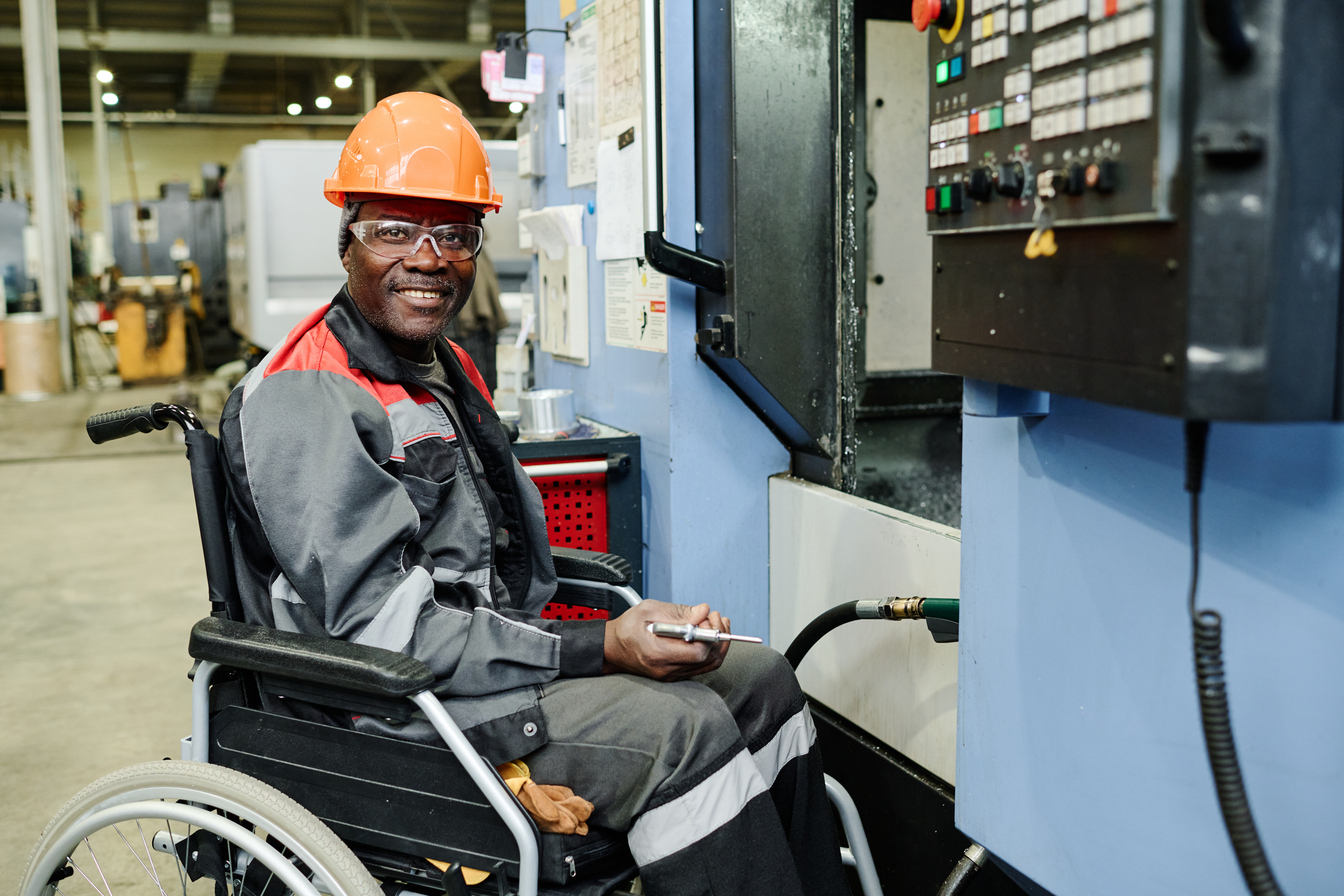Flexible Jobs For People With Disabilities Returning To Work

Last Updated: 11/24/2025
The typical work schedule—Monday through Friday, 9 AM to 5 PM in an office—has been the standard for decades. But for many people with disabilities (and a range of others as well), this rigid setup can be challenging. Getting to work, sitting in the same space for eight hours and following strict schedules can be difficult or impossible when dealing with health conditions.
The good news is that some of the fundamentals of work have been changing and continue to do so. More companies are offering flexible jobs that let people work in diverse ways. These changes help people in many different scenarios manage their lives more effectively. They're especially useful for people with disabilities who have decided they’re ready to return to work and need arrangements that fit their health needs and abilities.
We hear a lot of questions about different types of work and what’s possible, including:
- What are the best flexible working arrangements?
- What is an example of flexible work?
- What are the disadvantages of flexible working?
- What is the most flexible company to work for?
For people receiving Social Security Disability Insurance (SSDI), there’s a little-known program from the Social Security Administration (SSA) called Ticket To Work. This program is designed to assist SSDI recipients with attempting a return to work without losing benefits right away. Working with a Vocational Rehabilitation (VR) agency or an Employment Network (EN) like Allsup Employment Services lets beneficiaries use the services of career professionals who help find great fitting, flexible jobs for people with disabilities.
Understanding what flexible work options exist today can help you find a job that meets your needs while still providing good income and career growth.
Why Job Options Had To Grow
Traditional workplaces can create barriers that go beyond physical access issues. Fixed schedules often clash with doctor appointments, treatment times and the unpredictable nature of many health conditions. When your symptoms change from day to day or your energy levels vary, working the same hours each day can be extremely difficult.
Getting to work can also be a major challenge. Transportation issues, whether from physical limitations, high costs or unreliable public transit, can make even accessible workplaces hard to reach. The daily stress of commuting can also worsen health conditions, leaving you with less energy to do your job.
These challenges are real. People with disabilities have much higher unemployment rates than people without disabilities, even though many have valuable skills and want to work. This gap means lost opportunities for individuals and businesses alike.
What Makes Work Truly Flexible
Flexible jobs for people with disabilities means more than just changing your schedule occasionally or working from home occasionally. Real flexibility recognizes that people are most productive at different times and that your best work hours might not be the typical 9-to-5.
Good flexible arrangements also take into account that managing health conditions takes time and energy. This might mean taking breaks when you need them, adjusting your workload when symptoms get worse or having access to equipment and workspace changes that help you do your job better.
Companies are finding that offering flexible work options and guiding employees in managing change helps them too. They save money on office space, can hire talented people from anywhere and keep employees longer. Many businesses have learned that focusing on what gets done rather than when or where it happens leads to better results.
As for the question, “what is the most flexible company to work for?” The answer is: any company that understands the benefits of creating flexibility for their employees.
Let’s take a look at the different forms that flexible jobs can take.
Location-Based Flexibility
Remote work is one of the biggest game-changers for people with disabilities. When you can work from home, you don't have to worry about commuting, and you can set up your workspace exactly how you need it. Technology now makes it possible to do many different types of jobs from home. Customer service, data entry, writing, computer programming and consulting are just some examples. Such advances have caused a huge expansion of flexible jobs for people with disabilities.
Engaging with remote work can present challenges of its own. It requires specific skills such as digital literacy, time management and self-direction. Additionally, limited access to technology, reliable internet or a quiet, dedicated workspace can create real barriers. Looking ahead to train up and work out these demands is key to success.
Hybrid work splits time between home and office. You might work from home three days a week and go to the office two days or have complete freedom to choose when and where you work. This gives you options to work from home when your health requires it while still having in-person time.
Schedule-Based Flexibility
Flextime lets you choose when to start and end your workday, usually within certain limits. You might need to be available during busy hours but can work around medical appointments, medication schedules or times when you naturally have more energy.
Compressed schedules let you work your full hours in fewer days, providing longer periods for rest, medical care and recovery. Instead of five eight-hour days, you might work four ten-hour days, giving you three days off each week. Some people work nine days in two weeks and get every other Friday off.
Many people use part-time work while transitioning back to work after a health change, or as a long-term solution that balances income needs with health management. Some people combine several part-time jobs to create full-time income while keeping schedule flexibility.
Job sharing involves two people splitting one full-time position. Each person works part-time hours, and together they handle all the job responsibilities. This can give you the stability of a regular position with fewer hours to manage.
Project And Output-Based Flexibility
Freelance and contract work give you the most control over when and how much you work. As an independent contractor, you can take on more projects when you're feeling good and fewer when you need to focus on your health. You choose clients and projects that match your skills and interests, and work during your most productive hours.
Gig work involves short-term tasks through apps and websites. Some of the most flexible jobs for people with disabilities have emerged as gig roles. While the income can be unpredictable, you have complete control over your schedule and can accept jobs when you're able.
Results-Only Work Environments (ROWE) are workplaces where you're evaluated only on what you accomplish, not when, where or how you do it. If you meet your goals and deadlines, you determine your schedule and location.
Special Accommodation Programs
Phased return-to-work programs help you gradually get back to work after medical leave or when starting a new job with a disability. These programs usually start with fewer hours or easier tasks, slowly increasing as you build up your capacity. They often involve your doctor, employer and vocational expert working together to make sure the pace is right.
Customized employment designs the job around your skills and abilities. Instead of trying to fit into an existing job, employers work with you to identify tasks that need doing and that match what you can contribute. This lets a business get the help they need while providing a meaningful opportunity.
Self-scheduling systems let you choose your own shifts through computer programs or apps. This is common in healthcare, retail and customer service jobs. You can pick schedules that work best for your energy levels and medical needs while making sure the business is covered.
New Types Of Flexible Work
Asynchronous work means team members don't have to work at the same time. One can do their tasks when feeling their best, while another can respond when they're available. This works especially well for people whose energy or thinking ability changes throughout the day. Strong communication is needed for asynchronous work since you can't just walk over to someone's desk to ask questions.
Some forward-thinking companies offer unlimited paid time off, letting employees take time away from work as needed without counting days. These policies can result in some of the best jobs for people with disabilities who might need unexpected time off for medical care.
Industries With Flexible Job Options
There are a number of industries which have progressed farther than others in creating flexible jobs.
- Technology companies have led the way in flexible work and continue to offer some of the best opportunities. Jobs in software development, digital marketing, cybersecurity and technical writing often allow remote work and focus on results rather than hours.
- Creative fields like writing, graphic design, photography and video production are typically project-based, which naturally fits flexible scheduling. Many creative professionals successfully work with multiple clients while controlling their workload and schedule.
- Healthcare and social services offer many flexible opportunities, from telehealth jobs and medical record work to social work and case management. Many of these positions can be done remotely or with flexible hours while also providing meaningful work that helps others.
- Education has expanded into online formats, creating opportunities for course development, online teaching and corporate training that can often be done flexibly.
How To Find Flexible Jobs
Looking for flexible jobs for people with disabilities requires different strategies than traditional job hunting. Websites that specialize in remote and flexible work have become valuable resources, with job listings from employers who specifically offer flexible arrangements.
- FlexJobs has listings for remote, hybrid, part-time, freelance and flexible jobs.
- co lists remote jobs in tech, customer service, marketing and more.
- We Work Remotely bills itself as the largest job board for remote jobs.
There are also many job boards that focus on people with disabilities which can be searched for flexible job opportunities.
- abilityJOBS is one of the largest job boards for people with disabilities.
- Inclusively can connect seekers with employers committed to disability-friendly opportunities.
- disABLEDperson provides not only disability-friendly job listings but also scholarships for students with disabilities.
- Evenbreak is a well-known job board for people with disabilities.
- Chronically Capable focuses on job seekers with chronic illness and disabilities.
- DiversityJobs lets you filter for disability-friendly employers.
Extra Support For Success
Many people receiving SSDI find that working with an EN like Allsup Employment Services (AES) significantly improves their chances of finding flexible jobs. Our vocational experts understand both the opportunities and challenges of non-traditional work and provide personalized guidance.
Allsup Employment Services is an SSA-authorized EN for the Ticket To Work Program. We have over 11 years of experience helping thousands return to work successfully. We can help guide you through the SSDI work incentives on your return-to-work journey.
The Ticket To Work Program helps you protect your SSA disability benefits, and working with AES you can:
- Earn More. Make as much income as you choose during the Trial Work Period and protect your full SSDI benefits.
- Stress Less. Avoid medical disability reviews and the worry that comes with them.
- Keep Medicare. While working, you can keep Medicare for over seven years.
- Avoid Risk. If you stop working anytime within five years, your SSDI benefits can resume through a reinstatement process.
- Pay Nothing. As a Social Security-authorized Employment Network, our services are provided at no cost.
Choosing AES means working with an EN who’s focused on your goals and will work with you every step of the way.
Get started with no cost and no obligation.
You can reach Allsup Employment Services today by calling 866-540-5105 or requesting a call.
Related Articles

Preparing a Return to Work
How To Know It's Time To Return To Work After A Disability

Preparing a Return to Work
Overcoming Barriers To Employment With Disabilities

Preparing a Return to Work
Building Confidence To Get Back To Work With A Disability

Preparing a Return to Work
How To Find A New Career With Seasonal Jobs And Ticket To Work
Subscribe To Be Notified When A New SSDI + Work Blog Is Posted
Provide your email address here
